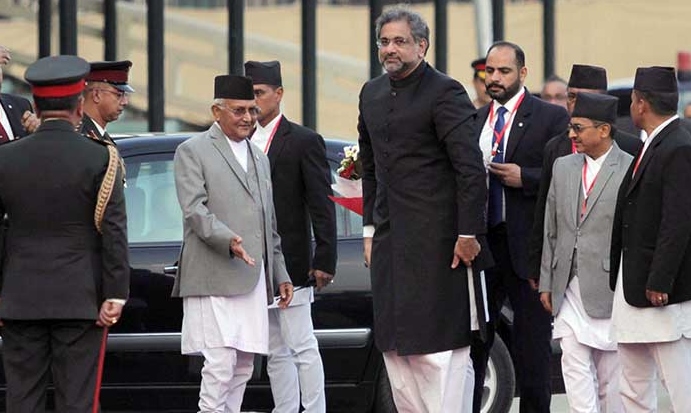By Gopal Sharma (KATHMANDU, 12 March 2018) – When the 19th SAARC Summit was ”postponed indefinitely” on 30 September 2016, the future of this regional forum had been questioned. For SAARC itself, the postponement of a Summit is not a new phenomenon, though the blame game exchanged between arch-rival India and Pakistan that time was serious in nature.
Moreover, all the member of SAARC, for the first time in its history, built their sub-block presenting them in either India’s axis or in Pakistan’s axis. The issue was terrorism; terrorism in all forms should have condemned with unity but there launched strategic cold war. On 18 September 2016, attack near the town of Uri in the Indian state of Jammu and Kashmir was staged by terrorist elements across the border, 19 Indian army personnel were killed. Blaming Pakistani government for this deadliest attack, India decided to boycott the Summit proposed for 15-16 November 2016.
Interestingly, Bangladesh immediately realized the Pakistan had been interfering in the domestic affairs of Bangladesh and pulled out of the Summit. Bhutan, Afghanistan, Maldives followed India.
As a chair of SAARC, Nepal formally announced the postponement of 19th Summit on 2 October 2016 citing the request made by other member states and also urged to remain vigilant in the terrorist elements in their respective countries. Even Nepal’s role as Chair had been under controversy.
After almost 16 months, the SAARC has been the at the centre stage of its member states, thanks to the Pakistani Prime Minister Abbasi, who brought the regional attention towards this near forgotten agenda.
Abbasi’s two days Nepal sojourn on 5-6 March 2018 has been the issue widely covered by the regional media, obviously in India and Pakistan but their perspectives and analysis are conflicting. But in all coverage and comments, the common content is to speed up the SAARC process what so ever the situation rises. Even the Indian strategic analysts have not strongly declared that the relevance of SAARC is over. But they seem much worried on ”China-backed Pakistan” and they think Abbbasi’s Nepal ”unpredicted ” visit was at the behest of China. Indian strategic thinkers have highlighted the ”China card” even in the Abbasi’s Nepal visit and they have linked it as OBOR block.
New Delhi’s stories about the Abbasi’s Nepal visit are far-fetched and fabricated. Indian foreign policy analysts have forgotten the recent visit of their foreign minister Shushma Swaraj to Nepal just to congratulate KP Sharma Oli, the Prime Minister-in- waiting or Chairman of the largest Communist Party of Nepal-CPN UML.
If Indian Prime Minister Narendra Modi can send his External Affairs Minister to Nepal to convey his congratulatory message, Pakistani Prime Minister can come in the same manner to convey his and Pakistani peoples’ message to KP Sharma Oli. It is in no way unjustifiable, it doesn’t harm Indian interest. Nepal should welcome all the head of governments\states to its land if they wish to come.
It seems clear that Prime Minister Abbasi’s Nepal visit was to congratulate Prime Minister KP Sharma Oli for the assumption of the high post securing 2\3 majority in parliament. The Pakistani government , day before, Prime Minister Abbasi embarked in Nepal visit, issued a press release that clearly informed about the agenda and issues of the official visit.
Pakistan government categorically highlighted the four objectives of the visit. In the statement, Islamabad at the first paragraph had said – Abbasi’s Nepal visit was as the part of Pakistan’s pro-active and outreach efforts to engage with regional countries. According this statement, this visit was just a part of Islamabad’s new policy and effort to engage pro-actively not just with Nepal but with all the member of SAARC.
The second important highlight of the visit was to congratulate Prime Minister KP Sharma Oli for his election success with strong commitment to create stable and prosperous Nepal. The third is obviously an opportunity to further expand and strengthen bilateral relations across all areas of mutual interest including trade, tourism, defense and people to people contacts.
The fourth as they have mentioned in the statement about invigorating SAARC as an important regional organization.
The best opportunity of the visit is to bring the ‘lost’ SAARC process in serious dialogue among the member nations. SAARC’s 19th summit was supposed to hold in October 2016 in Islamabad, capital of Pakistan. But India made a decision to boycott the summit citing the terrorist attack in Uri by Pak occupied Kashmir.
Thereafter SAARC stayed eloped during this almost two years though the common bodies and mechanism had been working. India’s priority was never in SAARC, therefore the summit has now not been the issue of New Delhi.
Prime Minister Abbasi’s Nepal visit has once again highlighted the importance of this regional forum, which aims to build the whole region as an Union.


